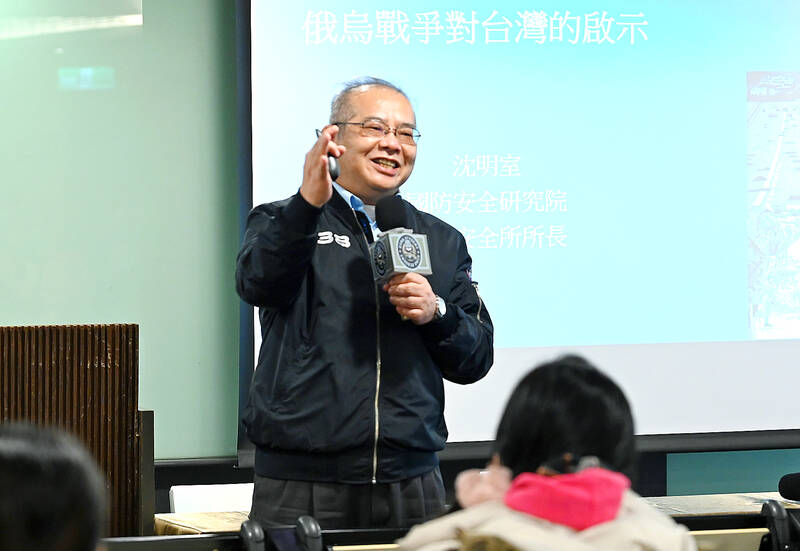China’s unilateral decision to alter its M503 flight path is an attempt to put pressure on Taiwan’s air defenses and is an act of “legal warfare” to further isolate Taiwan internationally, experts said on Tuesday.
National Policy Foundation associate research fellow Chieh Chung (揭仲) said that Beijing’s announcement imposes constraints on Taiwan’s air defense strategies and reduces air force response times.
It was a unilateral move that attempts to negate the existence of the median line and undermine the legality of Taiwan’s designation of restricted airspace, Chieh said.

Photo: Wang Yi-sung, Taipei Times
Institute for National Defense and Security Research fellow Shen Ming-shih (沈明室) said that Taiwan would be under greater pressure to keep an eye on regional air traffic, as it would now have to monitor Chinese military and civilian planes in addition to planes accessing Taiwan.
“The Chinese Communist Party has essentially erased the ‘gray area’ between war and peace,” Shen said.
The move was an apparent response to the results of last month’s presidential election, he said.
Defence International editor-in-chief Chen Kuo-ming (陳國銘) said that the move was aimed at the incoming administration of president-elect William Lai (賴清德) and there would be other such actions before Lai is inaugurated on May 20.
The chances of the M503 flight path facilitating a possible hostile takeover of Taiwanese airfields are slim, as China has limited air-drop capabilities and Taiwan’s military has the means to act against such an incursion, Chen said.
China has stated that the move was “to alleviate growing pressure on regional flights,” which is a civilian transportation issue, he said, adding that Taiwan’s civilian flight authorities should look into how to respond.
A Voice of America report cited Council on Foreign Relations researcher David Sack as saying that the move is a “legal warfare” ploy targeting Taiwan and that the Chinese government’s attempt to remove Taiwan’s legal presence was worrying.
The US and allies Japan and Australia could help integrate Taiwan into regional trading systems, and encourage interactions between Taipei and other countries with which it does not have official diplomatic relations to counter China’s ploy, Sack said.
Most importantly, Taiwan’s self-defense capabilities must be bolstered to reduce the military threat from Beijing, he said.
Chaoyang University of Technology Department of Aviation Technology associate professor Alex Lu (盧衍良) said that setting aside political issues, the M503, W122 and W123 flight paths considerably overlap with airspace used by Taiwan.
Given flight safety considerations and the spirit of document 9426 of the International Civil Aviation Organization, both sides should seek dialogue and to understand how each other operates to minimize the risk of planes passing close to, or crashing into, each other, Lu said.

A preclearance service to facilitate entry for people traveling to select airports in Japan would be available from Thursday next week to Feb. 25 at Taiwan Taoyuan International Airport, Taoyuan International Airport Corp (TIAC) said on Tuesday. The service was first made available to Taiwanese travelers throughout the winter vacation of 2024 and during the Lunar New Year holiday. In addition to flights to the Japanese cities of Hakodate, Asahikawa, Akita, Sendai, Niigata, Okayama, Takamatsu, Kumamoto and Kagoshima, the service would be available to travelers to Kobe and Oita. The service can be accessed by passengers of 15 flight routes operated by

GIVE AND TAKE: Blood demand continues to rise each year, while fewer young donors are available due to the nation’s falling birthrate, a doctor said Blood donors can redeem points earned from donations to obtain limited edition Formosan black bear travel mugs, the Kaohsiung Blood Center said yesterday, as it announced a goal of stocking 20,000 units of blood prior to the Lunar New Year. The last month of the lunar year is National Blood Donation Month, when local centers seek to stockpile blood for use during the Lunar New Year holiday. The blood demand in southern Taiwan — including Tainan and Kaohsiung, as well as Chiayi, Pingtung, Penghu and Taitung counties — is about 2,000 units per day, the center said. The donation campaign aims to boost

ENHANCING EFFICIENCY: The apron can accommodate 16 airplanes overnight at Taoyuan airport while work on the third runway continues, the transport minister said A new temporary overnight parking apron at Taiwan Taoyuan International Airport is to start operating on Friday next week to boost operational efficiency while the third runway is being constructed, the Ministry of Transportation and Communications said yesterday. The apron — one of the crucial projects in the construction of the third runway — can accommodate 16 aircraft overnight at the nation’s largest international airport, Minister of Transportation and Communications Chen Shih-kai (陳世凱) told reporters while inspecting the new facility yesterday morning. Aside from providing the airport operator with greater flexibility in aircraft parking during the third runway construction,

American climber Alex Honnold is to attempt a free climb of Taipei 101 today at 9am, with traffic closures around the skyscraper. To accommodate the climb attempt and filming, the Taipei Department of Transportation said traffic controls would be enforced around the Taipei 101 area. If weather conditions delay the climb, the restrictions would be pushed back to tomorrow. Traffic controls would be in place today from 7am to 11am around the Taipei 101 area, the department said. Songzhi Road would be fully closed in both directions between Songlian Road and Xinyi Road Sec 5, it said, adding that bidirectional traffic controls would